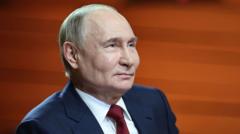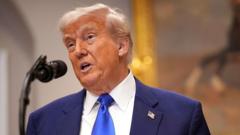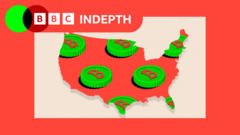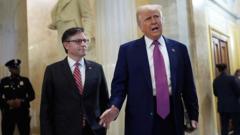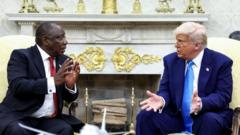In a controversial move, President Trump has publicly supported Marine Le Pen, condemning her recent conviction as politically motivated persecution while ignoring evidence against her. The case has sparked debates on free speech and the role of law in politics.
Trump Defends Le Pen: Accusations of Persecution in French Politics

Trump Defends Le Pen: Accusations of Persecution in French Politics
President Trump and Elon Musk rally behind French far-right leader amid her legal troubles, claiming bias against the far right.
April 4, 2025, 10:52 a.m. ET
“FREE MARINE LE PEN!” This unusual proclamation came from President Trump as he stepped into the European political arena, voicing his support for Marine Le Pen—the far-right French politician currently facing legal repercussions. Le Pen’s conviction on embezzlement charges has resulted in her disqualification from holding public office for a five-year period.
In a statement on Truth Social, Trump characterized the conviction as a glaring example of "European Leftists using Lawfare to silence Free Speech." Backing him up, billionaire entrepreneur Elon Musk echoed the sentiment on his platform, X, amplifying calls to "Free Le Pen!"
Such interventions from an American president in French matters mark significant diplomatic maneuvering, yet both Trump and Musk seem to downplay substantial evidence against Le Pen. She has been found guilty of orchestrating schemes that diverted European taxpayer funds to alleviate her party, the National Rally's, financial woes over time.
Rather than recognize the legal ramifications, Trump and his supporters have turned the narrative into one criticizing the separation of powers and the rule of law, painted by Vice President JD Vance as an obstruction of democracy to suppress right-wing movements.
Le Pen is expected to address a substantial National Rally demonstration in Paris this Sunday, rallying under the banner “Let’s Save Democracy!” Her party, originally founded in 1972 by her father, Jean-Marie Le Pen, as the National Front, has undergone significant rebranding despite its historically controversial roots.
As the rhetoric intensifies, the intersection of American and European politics raises complex questions about political alliances, the influence of leaders across borders, and the implications for democratic institutions.
“FREE MARINE LE PEN!” This unusual proclamation came from President Trump as he stepped into the European political arena, voicing his support for Marine Le Pen—the far-right French politician currently facing legal repercussions. Le Pen’s conviction on embezzlement charges has resulted in her disqualification from holding public office for a five-year period.
In a statement on Truth Social, Trump characterized the conviction as a glaring example of "European Leftists using Lawfare to silence Free Speech." Backing him up, billionaire entrepreneur Elon Musk echoed the sentiment on his platform, X, amplifying calls to "Free Le Pen!"
Such interventions from an American president in French matters mark significant diplomatic maneuvering, yet both Trump and Musk seem to downplay substantial evidence against Le Pen. She has been found guilty of orchestrating schemes that diverted European taxpayer funds to alleviate her party, the National Rally's, financial woes over time.
Rather than recognize the legal ramifications, Trump and his supporters have turned the narrative into one criticizing the separation of powers and the rule of law, painted by Vice President JD Vance as an obstruction of democracy to suppress right-wing movements.
Le Pen is expected to address a substantial National Rally demonstration in Paris this Sunday, rallying under the banner “Let’s Save Democracy!” Her party, originally founded in 1972 by her father, Jean-Marie Le Pen, as the National Front, has undergone significant rebranding despite its historically controversial roots.
As the rhetoric intensifies, the intersection of American and European politics raises complex questions about political alliances, the influence of leaders across borders, and the implications for democratic institutions.






